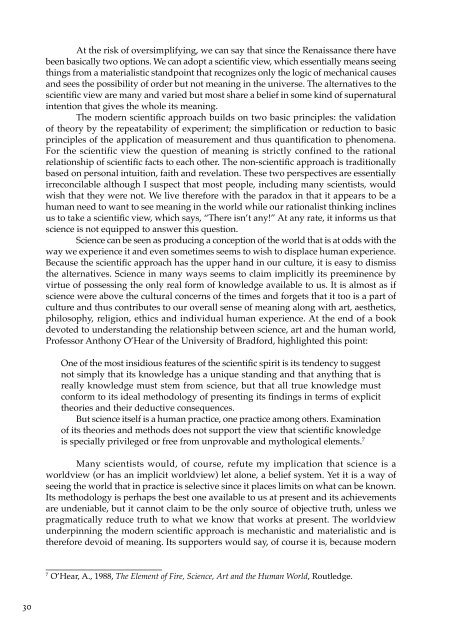The Spirit in Human Evolution - Waldorf Research Institute
The Spirit in Human Evolution - Waldorf Research Institute
The Spirit in Human Evolution - Waldorf Research Institute
Create successful ePaper yourself
Turn your PDF publications into a flip-book with our unique Google optimized e-Paper software.
At the risk of oversimplify<strong>in</strong>g, we can say that s<strong>in</strong>ce the Renaissance there have<br />
been basically two options. We can adopt a scientific view, which essentially means see<strong>in</strong>g<br />
th<strong>in</strong>gs from a materialistic standpo<strong>in</strong>t that recognizes only the logic of mechanical causes<br />
and sees the possibility of order but not mean<strong>in</strong>g <strong>in</strong> the universe. <strong>The</strong> alternatives to the<br />
scientific view are many and varied but most share a belief <strong>in</strong> some k<strong>in</strong>d of supernatural<br />
<strong>in</strong>tention that gives the whole its mean<strong>in</strong>g.<br />
<strong>The</strong> modern scientific approach builds on two basic pr<strong>in</strong>ciples: the validation<br />
of theory by the repeatability of experiment; the simplification or reduction to basic<br />
pr<strong>in</strong>ciples of the application of measurement and thus quantification to phenomena.<br />
For the scientific view the question of mean<strong>in</strong>g is strictly conf<strong>in</strong>ed to the rational<br />
relationship of scientific facts to each other. <strong>The</strong> non-scientific approach is traditionally<br />
based on personal <strong>in</strong>tuition, faith and revelation. <strong>The</strong>se two perspectives are essentially<br />
irreconcilable although I suspect that most people, <strong>in</strong>clud<strong>in</strong>g many scientists, would<br />
wish that they were not. We live therefore with the paradox <strong>in</strong> that it appears to be a<br />
human need to want to see mean<strong>in</strong>g <strong>in</strong> the world while our rationalist th<strong>in</strong>k<strong>in</strong>g <strong>in</strong>cl<strong>in</strong>es<br />
us to take a scientific view, which says, “<strong>The</strong>re isn’t any!” At any rate, it <strong>in</strong>forms us that<br />
science is not equipped to answer this question.<br />
Science can be seen as produc<strong>in</strong>g a conception of the world that is at odds with the<br />
way we experience it and even sometimes seems to wish to displace human experience.<br />
Because the scientific approach has the upper hand <strong>in</strong> our culture, it is easy to dismiss<br />
the alternatives. Science <strong>in</strong> many ways seems to claim implicitly its preem<strong>in</strong>ence by<br />
virtue of possess<strong>in</strong>g the only real form of knowledge available to us. It is almost as if<br />
science were above the cultural concerns of the times and forgets that it too is a part of<br />
culture and thus contributes to our overall sense of mean<strong>in</strong>g along with art, aesthetics,<br />
philosophy, religion, ethics and <strong>in</strong>dividual human experience. At the end of a book<br />
devoted to understand<strong>in</strong>g the relationship between science, art and the human world,<br />
Professor Anthony O’Hear of the University of Bradford, highlighted this po<strong>in</strong>t:<br />
One of the most <strong>in</strong>sidious features of the scientific spirit is its tendency to suggest<br />
not simply that its knowledge has a unique stand<strong>in</strong>g and that anyth<strong>in</strong>g that is<br />
really knowledge must stem from science, but that all true knowledge must<br />
conform to its ideal methodology of present<strong>in</strong>g its f<strong>in</strong>d<strong>in</strong>gs <strong>in</strong> terms of explicit<br />
theories and their deductive consequences.<br />
But science itself is a human practice, one practice among others. Exam<strong>in</strong>ation<br />
of its theories and methods does not support the view that scientific knowledge<br />
is specially privileged or free from unprovable and mythological elements. 7<br />
Many scientists would, of course, refute my implication that science is a<br />
worldview (or has an implicit worldview) let alone, a belief system. Yet it is a way of<br />
see<strong>in</strong>g the world that <strong>in</strong> practice is selective s<strong>in</strong>ce it places limits on what can be known.<br />
Its methodology is perhaps the best one available to us at present and its achievements<br />
are undeniable, but it cannot claim to be the only source of objective truth, unless we<br />
pragmatically reduce truth to what we know that works at present. <strong>The</strong> worldview<br />
underp<strong>in</strong>n<strong>in</strong>g the modern scientific approach is mechanistic and materialistic and is<br />
therefore devoid of mean<strong>in</strong>g. Its supporters would say, of course it is, because modern<br />
_________________________<br />
7<br />
O’Hear, A., 1988, <strong>The</strong> Element of Fire, Science, Art and the <strong>Human</strong> World, Routledge.<br />
30
















